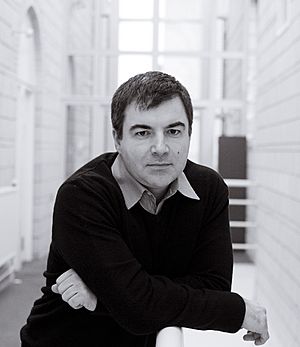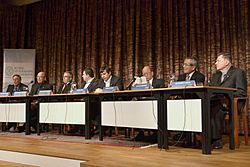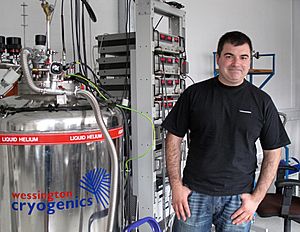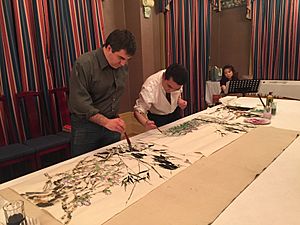Konstantin Novoselov facts for kids
Quick facts for kids
Sir Konstantin Novoselov
FRS FInstP FRSC
|
|
|---|---|

Novoselov in 2013
|
|
| Born |
Konstantin Sergeevich Novoselov
23 August 1974 Nizhny Tagil, Russian SFSR, Soviet Union
|
| Nationality | Russia and United Kingdom |
| Other names | Kostya Novoselov |
| Alma mater |
|
| Known for | graphene |
| Spouse(s) | Irina Barbolina |
| Awards |
|
| Scientific career | |
| Fields | Solid-state physics |
| Institutions |
|
| Thesis | Development and Applications of Mesoscopic Hall Microprobes (2004) |
| Doctoral advisor |
|
Sir Konstantin Sergeevich Novoselov, born on August 23, 1974, is a famous Russian-British physicist. He is best known for his amazing work on a material called graphene. He shared the Nobel Prize in Physics in 2010 with his colleague, Andre Geim, for this discovery.
Today, Novoselov is a professor at the National University of Singapore. He also holds a special position at the University of Manchester in the UK.
Contents
Becoming a Scientist
Konstantin Novoselov was born in Nizhny Tagil, which was part of the Soviet Union at the time. He earned his first science degree from the Moscow Institute of Physics and Technology in 1997. Later, he received his PhD from the Radboud University of Nijmegen in 2004. His PhD research was guided by Andre Geim, who would later become his Nobel Prize co-winner.
Friends and colleagues often call Konstantin by his nickname, "Kostya."
Discovering Graphene and More
Kostya Novoselov is a very active researcher. He has published hundreds of scientific papers on many different topics. His most famous discovery is graphene. Graphene is a super-thin material, just one atom thick, made of carbon. It's incredibly strong and can conduct electricity very well.
Novoselov was a key part of the Graphene Flagship project. This was a huge European effort to explore and use graphene. He also helped lead the National Graphene Institute as its first director. This institute is a major center for graphene research.
He has been recognized as one of the world's top researchers. Many of his scientific papers are considered "hot papers" because they are so important and widely read by other scientists. In 2014, he was named among the most highly cited researchers globally.
In 2019, Novoselov joined the National University of Singapore. He helped start a new research center there called IFIM. This center focuses on creating "functional intelligent materials." These are materials designed to do specific smart things, like respond to changes in their environment.
Awards and Special Recognitions

Konstantin Novoselov has received many awards for his scientific work:
- 2007 Nicholas Kurti European Science Prize: For his new work in low temperatures and strong magnetic fields.
- 2008 Europhysics Prize: Shared with Andre Geim for finding and isolating graphene and understanding its amazing electrical properties.
- 2010 Nobel Prize in Physics: Shared with Andre Geim for their groundbreaking experiments with graphene. Novoselov was one of the youngest people ever to win the Nobel Prize in Physics.
- 2011 Fellow of the Royal Society (FRS): A very high honor for scientists in the UK.
- 2012 Knight Bachelor: He was given the title "Sir" by the Queen for his services to science.
- 2013 Leverhulme Medal: For his revolutionary work on graphene and other two-dimensional materials.
- 2014 Onsager Medal: Another award for his important contributions to physics.
- 2016 Carbon Medal and Dalton Medal: Awards recognizing his work with carbon materials.
- 2019 Member of the National Academy of Sciences: Elected as a foreign associate to this prestigious US academy.
- 2023 Kublai Khan Medal: Awarded by the Mongolian Academy of Sciences.
- 2024 Contribution to Knowledge Platinum Medal Award: Shared with Andre Geim from the Institute of Materials, Minerals and Mining.
Designing the National Graphene Institute
Novoselov played a big part in creating the National Graphene Institute in Manchester. He helped with the building's design and technical features. The building's outer covering even shows scientific formulas from his early work on graphene. He has mentioned that some scientific jokes are hidden among these formulas!
He also helped write a book about the unique architecture of the National Graphene Institute.
Other Interesting Projects
In 2018, Professor Novoselov helped with a cool project at the Jodrell Bank Observatory. He worked with Professor Tim O'Brian to understand old radio signals. These signals were from the Soviet Zond 6 spacecraft, received by the observatory's radio telescope back in 1968.
His Legacy
Konstantin Novoselov's work has had a lasting impact.
- Novoselov International Materials Award: An award has been created in his honor. It recognizes scientists who make amazing discoveries in materials science that help with sustainable development.
- University of Manchester Recognition: His name is carved into a special pavement at the University of Manchester, celebrating him as a notable former student.
Art and Science
Novoselov has a strong interest in art. He practices traditional Chinese drawing and has been involved in several modern art projects.
In 2015, he worked with artist Cornelia Parker for the opening of the Whitworth Art Gallery. He used a graphene gas sensor to launch a "meteorite shower" firework. The graphene he used came from tiny bits of graphite taken from drawings by famous artists like William Blake and Pablo Picasso. He explained that only microscopic amounts were used.
Novoselov believes that artists and scientists are similar. He says they both need curiosity, a desire to learn, and imagination. He sees them as "two sides of the same medal."
He enjoys Chinese calligraphy and drawing, learning from a well-known Chinese artist, Zheng Shenglong. Some of his paintings have been shown in exhibitions, and one is even in the collection of the President of China, Xi Jinping. In 2017, five of his artworks were shown at the Viennacontemporary art fair. He even used graphene ink in some of these paintings.
In 2025, Novoselov helped organize an exhibition at the famous Venice Biennale art event.
Personal Life
Konstantin Novoselov is a citizen of both Russia and the United Kingdom. He is married and has two daughters.
See also
 In Spanish: Konstantín Novosiólov para niños
In Spanish: Konstantín Novosiólov para niños
 | Janet Taylor Pickett |
 | Synthia Saint James |
 | Howardena Pindell |
 | Faith Ringgold |



